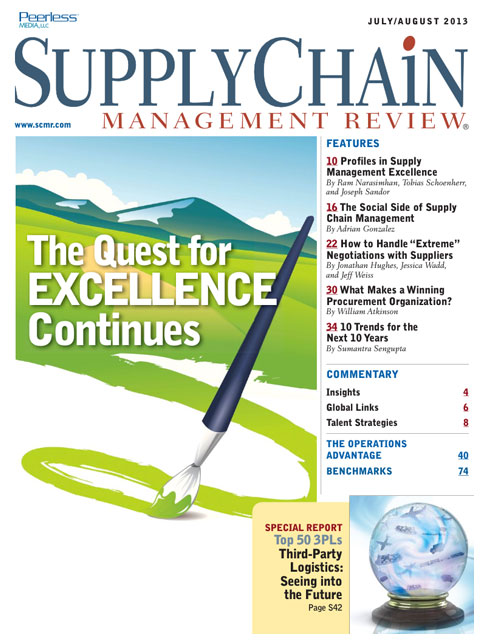Sorry, but your login has failed. Please recheck your login information and resubmit. If your subscription has expired, renew here.
July-August 2013
How do you extend the frontiers of supply management excellence and build a solid competitive advantage? Answers to this pivotal question emerged from an Executive Summit of supply chain leaders convened recently at Michigan State University. The four companies profiled here, all participants in that summit, have adopted principles that promote excellence and continue to expand that frontier. Browse this issue archive.Need Help? Contact customer service 847-559-7581 More options
What is procurement excellence? The answer depends on whom you ask. It seems that each expert comes at the concept from a different perspective.
For Robert Rudzki, procurement excellence is about understanding corporate leadership’s expectations for the function—regardless of how basic or how advanced these are—and then meeting those expectations. For Philip Carter, procurement excellence is about managing risk. For Robert Monczka, it’s about improving competitiveness. For Timothy Fiore, procurement excellence is about aligning with overall business objectives, and then collaborating around those objectives.
As diverse as these definitions seem, however, they are all in a way interconnected. For example, meeting corporate leadership’s expectations requires managing competitiveness, collaborating on corporate objectives, and managing risk. Managing competitiveness depends on the ability to meet corporate leadership expectations as well as the ability to collaborate and manage risk. Managing risk requires the ability to manage competitiveness and faster collaboration.
 |
This complete article is available to subscribers
only. Click on Log In Now at the top of this article for full access. Or, Start your PLUS+ subscription for instant access. |
Not ready to subscribe, but need this article?
Buy the complete article now. Only $20.00. Instant PDF Download.
Access the complete issue of Supply Chain Management Review magazine featuring
this article including every word, chart and table exactly as it appeared in the magazine.
SC
MR
Sorry, but your login has failed. Please recheck your login information and resubmit. If your subscription has expired, renew here.
July-August 2013
How do you extend the frontiers of supply management excellence and build a solid competitive advantage? Answers to this pivotal question emerged from an Executive Summit of supply chain leaders convened recently at… Browse this issue archive. Access your online digital edition. Download a PDF file of the July-August 2013 issue.
 |
Download Article PDF |
What is procurement excellence? The answer depends on whom you ask. It seems that each expert comes at the concept from a different perspective.
For Robert Rudzki, procurement excellence is about understanding corporate leadership’s expectations for the function—regardless of how basic or how advanced these are—and then meeting those expectations. For Philip Carter, procurement excellence is about managing risk. For Robert Monczka, it’s about improving competitiveness. For Timothy Fiore, procurement excellence is about aligning with overall business objectives, and then collaborating around those objectives.
As diverse as these definitions seem, however, they are all in a way interconnected. For example, meeting corporate leadership’s expectations requires managing competitiveness, collaborating on corporate objectives, and managing risk. Managing competitiveness depends on the ability to meet corporate leadership expectations as well as the ability to collaborate and manage risk. Managing risk requires the ability to manage competitiveness and faster collaboration.
 |
SUBSCRIBERS: Click here to download PDF of the full article. |
SC
MR

Latest Supply Chain News
- Survey reveals strategies for addressing supply chain, logistics labor shortages
- Israel, Ukraine aid package to increase pressure on aerospace and defense supply chains
- How CPG brands can deliver on supplier diversity promises
- How S&OP provides the answer to in-demand products
- AI, virtual reality is bringing experiential learning into the modern age
- More News
Latest Podcast

 Explore
Explore
Topics
Latest Supply Chain News
- Survey reveals strategies for addressing supply chain, logistics labor shortages
- Israel, Ukraine aid package to increase pressure on aerospace and defense supply chains
- How CPG brands can deliver on supplier diversity promises
- How S&OP provides the answer to in-demand products
- AI, virtual reality is bringing experiential learning into the modern age
- Humanoid robots’ place in an intralogistics smart robot strategy
- More latest news
Latest Resources

Subscribe

Supply Chain Management Review delivers the best industry content.

Editors’ Picks





